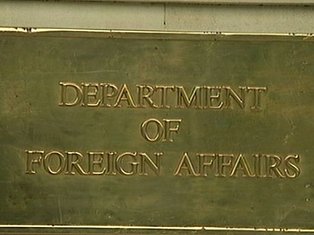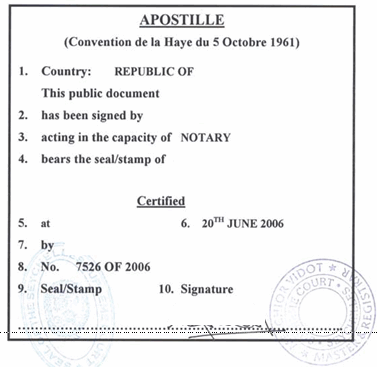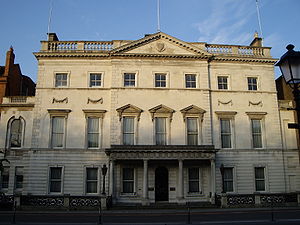Irish Notary Public Services in Dublin
We provide Notary on Call services to business in the the IFSC and Dublin City Centre
Apostille and Legalisation
There are two basic types of document legalization - 'Apostille' seal and consular legalisation (consular Legalization). Choice of the type of legalisation in each case depends on the destination country that is country, to which authorities it will be subsequently submitted.
Attachment of an “Apostille” stamp (sometimes this procedure is also called “simplified legalisation” or “Apostillisation ") is used for sending the document to the counties which have acceded to the Hague Convention of 5 October 1961, abolishing the requirement of consular legalization and deceptive simplified procedure of legalization - attachment of an “Apostille " stamp.Apostille
An Apostille is a certificate issued by the Department of Foreign Affairs verifying the genuineness of the signature and/or seal of a public officer e.g. a Notary Public, on a public document and the capacity in which he or she has acted. It is sometimes referred to as a 'fast-track' version of legalisation. Legalisation of a document is an implementation of a certain number of formal procedures in order to make the document legal in the territory of another state. The ultimate goal of the document legalization procedure, issued on the territory of one State, is the possibility of submitting it to the authorities of another State.
Document legalization is almost always required when it is necessary to be submitted to the authorities of another State. This means that a document issued, for example, in Ireland, is legal only on the territory of Ireland, where it can be fully used, but for its submission to the authorities of another country legalization will be required.
The exceptions to this rule are certain types of documents that cannot be legalized, as well as some countries with which Ireland has concluded a bilateral agreement, abolishing the requirement of legalization.
Legalisation of a document is always carried out in the country in which it was issued and / or completed.
The Apostille certificate may be stamped on or attached to the public document required to be apostilled. It is obtained by presenting the document at the Department of Foreign Affairs, Hainault House, 67-71 St. Stephen's Green, Dublin 2 and paying the appropriate consular fee.
The Apostille procedure applies in lieu of Legalisation between countries that have signed and ratified or acceded to the Hague Convention of 5 October 1961. Ireland ratified the Convention in 1999.Other countries in which the Apostille procedure applies may be checked on the the Hague Convention website, where a list of countries adhering to the Apostille system abolishing the need for legalisation, and also those countries not Hague Convention Countries Adhering or likely also on the Department of Foreign Affairs webpage.
Legalisation (in some countries spelled 'Legalization') is an internationally recognised procedure for certifying the authenticity of official signatures and/or official seal applied to a public document. It operates by means of an unbroken chain of verifying signatures commencing with that of the first signatory to the document and ending with the signature of the diplomatic or consular representative of the state in which the document is to produced and acted upon.
The legalisation procedure usually commences with the attestation by a Notary Public of the signature of a person to a formal document e.g. a Power of Attorney. The Notary Public having subscribed his or her name and affixed his or her official seal to the document by way of notarial act arranges for the document to be produced to the Registrar of the Supreme Court for the purpose of having the Notary's signature and official seal verified.
The document is then produced at the Consular Section of the Department of Foreign Affairs in Dublin for the purpose of having the signature of the Supreme Court Registrar verified and finally it is produced to the diplomatic or consular representative in Dublin (or London) of the foreign country in which it is intended the document shall be produced for the purpose of having the Irish Consular Officer's signature legalised.
When all the foregoing steps have been completed, the document is said to have been legalised.Document legalization is not needed in three cases:
- when the institution in which you submit the document does not require its legalisation (legalization);
- when between Ireland and the State, on which territory you plan to use the document, concluded a bilateral agreement, abolishing the requirement of legalization;
- when the legalisation of the document can not be performed by the reason of its kind, type or character.
In all other cases, the legalization of the document for sending it abroad is required.
Other countries in which the Apostille procedure applies may be checked on the the Hague Convention website, where a list of countries adhering to the Apostille system abolishing the need for legalisation, and also those countries not Hague Convention Countries adhereing likely also on the Department of Foreign Affairs webpage
To summarise, the 1961 Hague Convention abolished the requirement for Foreign Public Documents (e.g. birth, death and marriage certificates, documents issued by a Notary Public) to be legalised for countries that are parties to the Convention.
The Convention entered into force for Ireland on 9 March 1999. For further information on the Hague Convention please access their website.
However, countries that are parties to the Convention may request the bearer of a document issued by a public authority to obtain an Apostille from the Authorities of the country that issued the document.
An Apostille involves the addition of a certificate, either stamped on the document itself or attached to it. It certifies the country of origin of the document, the identity and capacity in which the document has been signed and the name of any authority which has affixed a seal or stamp to the document.Documents that the Dept of Foreign Affairs can Authenticate\Apostille
The Department of Foreign Affairs and Trade can Authenticate\Apostille documents of Irish origin provided that they bear an original signature, seal or stamp from an Irish practising public official or organisation. An Irish document means that it originated or has been executed in Ireland. If a practising Irish solicitor, Notary Public or Commissioner for Oaths is signing a document they should state clearly what exactly it is they are certifying in relation to the document. They must sign their own name and not use a company signature.
Examples of Documents the Department can Authenticate\Apostille are:
The Department of Foreign Affairs and Trade can Authenticate\Apostille public documents which have been executed in the territory of One Contracting State and which have to be produced in the territory of another Contracting State.
Examples:
- Court documents, Powers of Attorney, and other Notarial Acts can be Authenticated provided they bear an original signature, seal or stamp from a practising Irish solicitor\ Notary Public in Ireland
An appointment is necessary for large numbers of documents and for full foreign adoption dossiers.
Photocopies of Documents
The Department can Authenticate\Apostille photocopies of certain types of documents provided they have been certified by a practising Irish Solicitor or Notary Public in Ireland. However, you should in the first instance confirm with the authority to whom you are presenting the document that a certified copy will be acceptable to them.
L'ABC de l'Apostille
Brochure à l'attention des utilisateurs d'Apostilles, qui fournit des réponses courtes aux questions les plus fréquemment posées, notamment quand, où etcomment les Apostilles sont émises et quels sont leurs effets.Téléchargez ici.
____________________________
Notary Public Services
Cathal Young, Notary Public
History of Notary Publics
![Notary Public Nataries Public in Dublin notary public (or notary or public notary) in the common law world is a public officer constituted by law to serve the public in non-contentious matters usually concerned with estates, deeds, powers-of-attorney, and foreign and international business. A notary's main functions are to administer oaths and affirmations, take affidavits and statutory declarations, witness and authenticate the execution of certain classes of documents, take acknowledgments of deeds and other conveyances, protest notes and bills of exchange, provide notice of foreign drafts, prepare marine or ship's protests in cases of damage, provide exemplifications and notarial copies, and perform certain other official acts depending on the jurisdiction.[1] Any such act is known as a notarization. The term notary public only refers to common-law notaries and should not be confused with civil-law notaries.](/images/harp.gif)




![Dublin Solicitors, Notary Public and Commissioner of Oaths Notaries public (also called "notaries", "notarial officers", or "public notaries") hold an office which can trace its origins back to the ancient Roman Republic, before Cicero 106-43 B.C., when they were called scribae ("scribes"), tabellius ("writer"), or notarius ("notary"). They are easily the oldest continuing branch of the legal profession worldwide.[citation needed]](/images/dublincollage2small.JPG)


